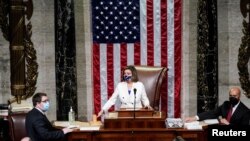The U.S. House of Representatives on Wednesday passed President Joe Biden’s $1.9 trillion coronavirus relief package aimed at giving a financial boost to American households and businesses, his first major legislative victory since assuming office on January 20.
The bill, which already cleared the Senate, now goes to Biden, who will sign it into law Friday, according to White House spokesperson Jen Psaki.
Minutes before the 220-211 vote, largely along party lines, House Speaker Nancy Pelosi said, “We will get to work immediately to delivering life-saving resources springing from this bill as soon as it is passed and signed, as we join President Biden in his promise that help is on the way.”
Republican lawmakers have objected to the package, saying it is too large and does not sufficiently target those who are most in need of economic assistance. House Minority Leader Kevin McCarthy on Tuesday called the bill “costly, corrupt, and liberal.”
The measure narrowly passed in the Senate on Saturday after the chamber altered some aspects of a bill approved earlier by the House. Among the changes was the removal of an increase in the federal minimum wage.
The measure includes $1,400 checks for all but the highest-earning adults in the country, and $3,000 or $3,600 to children, depending on their age. Unemployed workers will continue to get $300-a-week national government payments into early September on top of state assistance. State and city governments will get $350 billion to help them recover from the pandemic.
Unlike a round of direct payments that went out last year in a coronavirus relief package, this time the checks will not have the signature of the president.
The package also includes tens of billions of dollars to fund coronavirus testing and contact tracing, as well as vaccine distribution, along with new aid for businesses that have been hard hit by directives that curtailed their operations over the last year.
Biden on Tuesday visited a hardware store in Washington that has benefited from a pandemic-related paycheck protection loan program.
Compared to coronavirus relief approved last year, Biden says the newest legislation targets loans more narrowly to small businesses. He said a lot of “mom-and-pop businesses got muscled out of the way by bigger companies that jumped in front of the line” a year ago.
WATCH: COVID relief bill
White House spokeswoman Jen Psaki praised the legislation at a news conference Monday, saying that while there were some changes on the margins as the Senate acted, it represented the “core” of what Biden originally proposed.
On Tuesday, she said Biden and other senior administration officials plan to continue to tout the benefits of the $1.9 trillion coronavirus relief plan after it passes.
“We certainly recognize that we can’t just sign a bill,” Psaki told reporters. “We will need to do some work and use our best voices, including the president, the vice president and others, to communicate to the American people the benefits of this package, how they can benefit from the package, how they can have access to [stimulus] checks.”
“So, I think you can certainly expect the president to be doing some travel, and we’ll have more details on that in the coming days,” she said.












